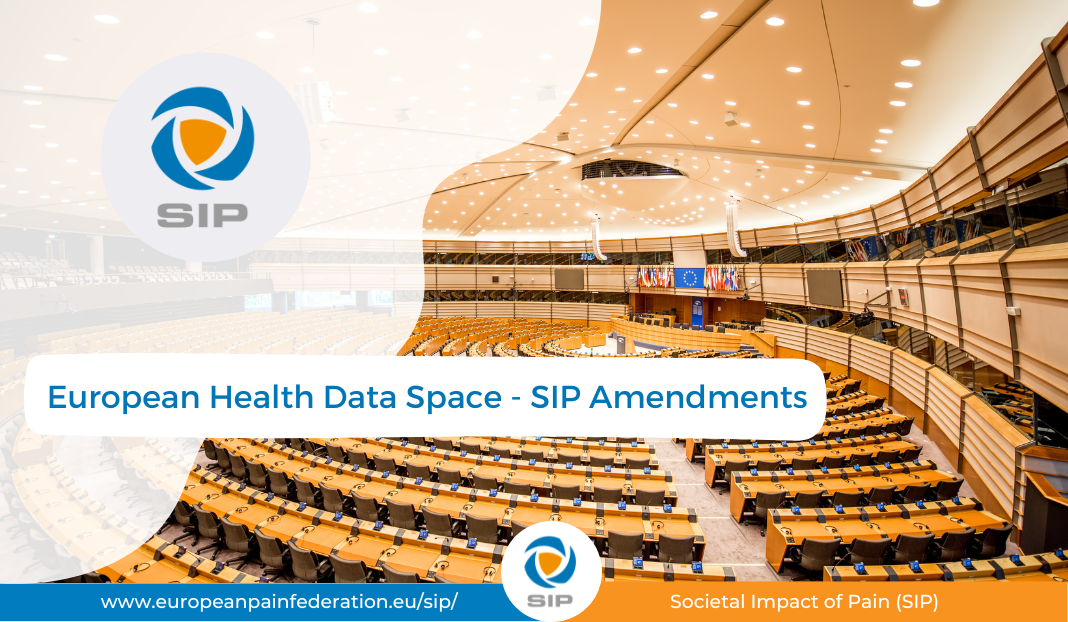On 28th November 2023, the joint ENVI (Environment, Public Health and Food Safety) and LIBE (Liberties) European Parliament Committees, approved the Report on a Proposal for a Regulation on the European Health Data Space (EHDS).
One of the main priorities for the Societal Impact of Pain (SIP) Platform in 2023 has been Digital Health, more specifically, the International Classification of Diseases – 11th Revision.
The International Classification of Diseases (ICD) is the international standard diagnostic tool for epidemiology, health management, research, and clinical purposes, as well as the international standard for reporting diseases and health conditions. The ICD allows for:
- Recording individual health conditions at the desired level of detail. This is why it is used in many health systems to diagnose conditions and determine which treatment is received,
- Generating healthcare statistics and reimbursement information,
- Sharing and comparing health information between hospitals, regions, settings, and countries,
- Comparing data in the same country across different time periods.
The ICD is updated at regular intervals to reflect the current state of health knowledge. Experts, international societies for the medical areas and professions, patients, and their organisations are brought together by the World Health Organization (WHO) to revise the ICD. On 25th May 2019, the World Health Assembly (WHA) adopted the ICD-11, and this latest revision which came into effect on 1st January 2022. The ICD-11 is the first classification system to include a systematic representation of chronic pain, and is publicly available via the WHO website.
SIP’s work on the topic started in late 2022 and early 2023, with the main goal of including a reference on ICD-11 within the EHDS European Parliament Report. SIP met with the ENVI Rapporteur MEP Sokol a number of times throughout the year to discuss the issue, which resulted in an ICD-11 reference within the Draft Report in Article 5, which refers to the scope of electronic health data, which encompasses six priorities categories (i.e. patient summaries, e-prescriptions, e-dispensations, medical images/image reports, laboratory results, and discharge reports).
Once the Draft Report was published, SIP prepared Amendments Recommendations, which resulted in a series of tabled Amendments, after which, SIP sent voting recommendations for. From those, two Amendments have been included in the final Report. Further SIP Amendments on key points such as, harmonisation, interoperability, and the need to use the latest version of coding systems, have also been included. Please find below the ICD Amendments:
- Article 5 – Paragraph 1 – Subparagraph 1 – Introductory Part:
- Where data is processed in electronic format, Member States shall implement access to and exchange of personal electronic health data for primary use fully or partially falling under the following categories making use of the International Classification of Diseases (ICD) codes, where applicable.
- Table A, Annex 1, Main Characteristics of Electronic Health Data Categories, Patient Summary :
- Electronic health data that includes important clinical facts related to an identified person and that is essential for the provision of safe and efficient healhcare to that person. The patient summary shall be harmonised across Member States and include a minimum data set that can be expanded to include disease-specific data. The following information is part of a patient summary:
- Personal details
- Contact information
- Information on insurance
- Allergies
- Medical alerts
- Vaccination/prohylaxis information, possibly in the form of a vaccination card
- Current, resolved, closed or inactive problems in an international classification coding system
- Textual information related to medical history
- Medical devices and implants
- Medical procedures
- Functional Status
- Current and relevant past medicines
- Social history observations related to health
- Pregnancy history
- Patient provided data
- Observation results pertaining to the health condition
- Plan of care
- Information on rare disease such as details about the impact or characteristics of the disease
- Electronic health data that includes important clinical facts related to an identified person and that is essential for the provision of safe and efficient healhcare to that person. The patient summary shall be harmonised across Member States and include a minimum data set that can be expanded to include disease-specific data. The following information is part of a patient summary:
The Report will be ratified at the Plenary Session on 11th December. The Trialogues will start in the new year. SIP welcomes the European Parliament Report and the references to the importance of implementing the International Classification of Diseases, and will continue to monitor and engage with policymakers to on the topic during the upcoming months.
